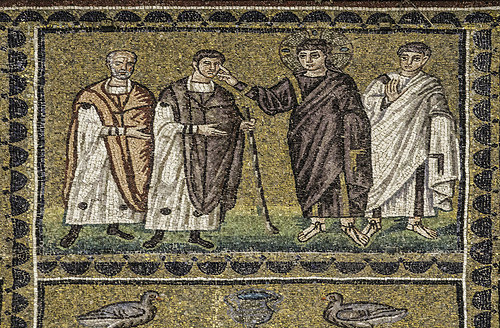We run our website the way we wished the whole internet worked: we provide high quality original content with no ads. We are funded solely by your direct support. Please consider supporting this project.

Does God Still Heal?
In the ancient world Jesus was known first and foremost as an exorcist and a healer. These two activities are mentioned in every summary of Jesus’s ministry found in the Gospels.
It’s common for Western Christians today to accept that infirmities (sickness, disease, injuries, disabilities and deformities) are part of God’s mysterious plan for their life. We may ask God to relieve us and others from physical afflictions, but we also pray for God to help us accept them as part of his mysterious “sovereign plan.”
Jesus and the early church had a different perspective, however. Never once did Jesus or anyone else in the New Testament encourage people to accept their afflictions as coming from God. Instead, they uniformly revolted against afflictions as being the direct or indirect byproducts of Satan’s oppressive regime. They viewed sickness and disease as part of the diabolic curse that afflicts the fallen world and they understood that the kingdom of God is all about reversing the curse. They believed that where God reigns, his original holistic design for the human body would be restored and the physical afflictions that were directly or indirectly brought about by the demonic powers would cease.
For example, Luke describes a woman who was “bent over and could not straighten up at all” as being “crippled by spirit.” When Jesus healed the woman certain religious authorities objected, for it was the Sabbath. But Jesus replied, “should not this woman, a daughter of Abraham, whom Satan has kept down for 18 long years, be set free on the Sabbath day from what bound her?” (Luke 13:11, 16). The woman’s deformed back was the result of a crippling spirit and part of Satan’s oppressive regime.
The central role healing played in Jesus’s ministry as well as the close connection between physical infirmities and demonic activity is succinctly expressed by Peter when he summarizes Jesus’s ministry by saying, “he went around doing good and healing all who were under the power of the devil” (Acts 10:38). Jesus was all about reversing the curse, and this included all forms of physical affliction.
This was the general understanding of the church for the first three centuries. In fact, the early church’s ability to free people from physical afflictions and demonic oppression was one of the strongest tools of evangelism. While healers and exorcists were rather common in the ancient world, it was widely conceded that no one could heal or deliver people as effectively and as consistently as Christians.
Since the job of the church is to manifest everything Jesus manifested and revolt against everything Jesus revolted against, we must accept that manifesting God’s original holistic design for the human body while revolting against the powers that afflict us physically remains a central part of our kingdom mandate. We are called to revolt against physical infirmities as part of Satan’s regime, not accept them as part of God’s mysterious will.
We are called to trust that God can and does continue to heal people today.
Image by Lawrence OP via Flickr
Category: Q&A
Tags: Faith, Sickness, Spiritual Warfare, Warfare Worldview, healing
Topics: Faith & Doubt, The Problem of Evil
Related Reading

Jesus and the Reality of Spiritual Warfare
In yesterday’s post, we discussed how challenging it can be to believe in the reality of a spiritual realm in the modern world. Today, let’s look at how Jesus’ ministry relates to this spiritual reality. While Jesus and his followers of course believed that God was the ultimate Lord over all creation, they clearly viewed…

Why Bart Ehrman Doesn’t Have to Ruin Your Christmas (Or Your Faith) Part 1
This is the first of several videos Greg put together to refute Bart Ehrman’s claims published in the article What Do We Really Know About Jesus? Greg went to school with Bart and is very familiar with his line of thought. He’s also heard of many people who have lost their faith based on his writings.…

Analogies For Understanding Prayer
God is all-powerful, which means he owns all the “say-so” there is. But when he decided to populate the creation with free agents, he gave each human various units of “say-so.” [Click here for yesterday’s post on “say-so.”] We each have a certain amount of power to affect what comes to pass by our choices.…

When Prayers Go Unanswered
Recently Frank Viola published a free e-book where 21 Christian leaders responded to the following question: Why is it that God doesn’t often answer the desperate prayers of His people for deliverance, protection, healing, etc.? You can download the free ebook by clicking here. The following excerpt is Greg’s contribution to this book: _____________________ Two very ill children are…

Is Suffering Part of God’s Secret Plan?
In the Christian tradition since Augustine, the most common explanation for the apparent arbitrariness of life and God’s interaction with humanity has been God’s mysterious will—his “secret plan,” as Calvin says. Whether or not a child is born healthy or a wife is killed by an intruder is ultimately decided by God. If we ask…

Do the Principalities & Powers Exist Within Space & Time?
In this episode Greg Answers: How do you fight, with a body bound to space and time, against something that doesn’t exist in space in time? Links: God at War Episode 34 http://traffic.libsyn.com/askgregboyd/Episode_0034.mp3
